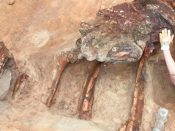Por Wilhelm Schlag (Yale University).
In the 1950s Phil Anderson made a prediction about the effect of random impurities on the conductivity properties of a crystal. Mathematically, these questions amount to the study of solutions of differential or difference equations and the associated spectral theory of self-adjoint operators obtained from an ergodic process. With the arrival of quasicrystals, in addition to random models, nonrandom lattice models such as those generated by irrational rotations or skew-rotations on tori have been studied over the past 30 years.
By now, an extensive mathematical theory has developed around Anderson’s predictions, with several questions remaining open. This talk will attempt to survey certain aspects of the field, with an emphasis on the theory of SL(2,R) cocycles with an irrational or Diophantine rotation on the circle as base dynamics. In this setting, Artur Avila discovered about a decade ago that the Lyapunov exponent is piecewise affine in the imaginary direction after complexification of the circle. In fact, the slopes of these affine functions are integer valued. This is easy to see in the uniformly hyperbolic case, which is equivalent to energies falling into the gaps of the spectrum, due to the winding number of the complexified Lyapunov exponent. Remarkably, this property persists also in the non-uniformly hyperbolic case, i.e., on the spectrum of the Schrödinger operator. This requires a delicate continuity property of the Lyapunov exponent in both energy and frequency. Avila built his global theory (Acta Math. 2015) on this quantization property. I will present some recent results with Rui HAN (Louisiana) connecting Avila’s notion of acceleration (the slope of the complexified Lyapunov exponent in the imaginary direction) to the number of zeros of the determinants of finite volume Hamiltonians relative to the complex toral variable. This connection allows one to answer questions arising in the supercritical case of Avila’s global theory concerning the measure of the second stratum, Anderson localization on this stratum, as well as settle a conjecture on the Hölder regularity of the integrated density of states.






















